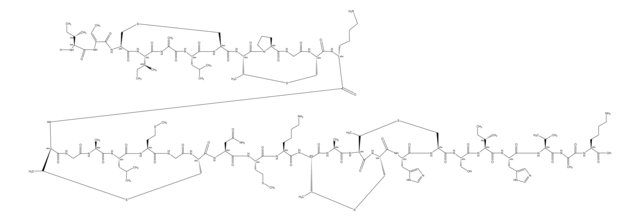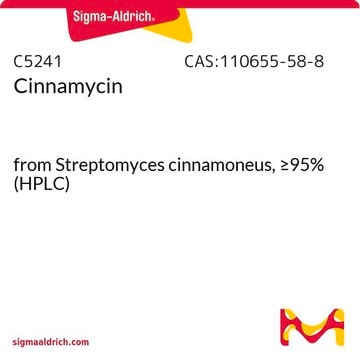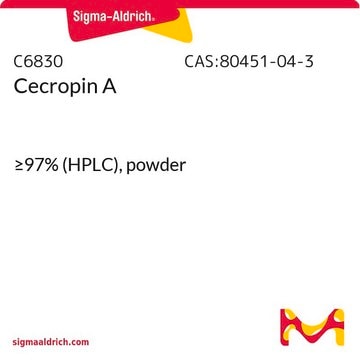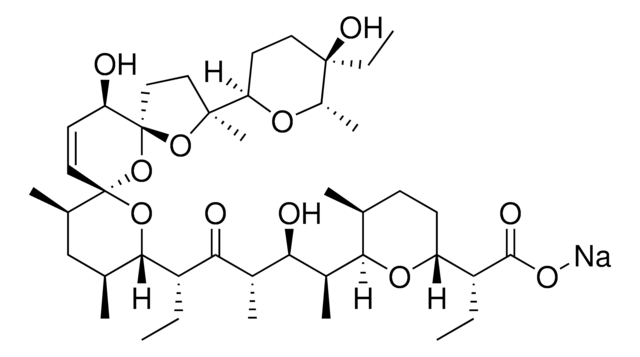SBR00021
Nisin Ready Made Solution
(20,000-40,000 IU/mL in 0.02N HCl)
Synonyme(s) :
Nisaplin
About This Item
Produits recommandés
Source biologique
Lactococcus lactis
Forme
solution
Concentration
(20,000-40,000 IU/mL in 0.02N HCl)
Densité
1.02 g/mL
Spectre d'activité de l'antibiotique
Gram-positive bacteria
Mode d’action
cell membrane | interferes
Conditions d'expédition
dry ice
Température de stockage
−20°C
Chaîne SMILES
O=C(N[C@H](C(NC(C(N[C@@H](CCCCN)C(O)=O)=O)=C)=O)C(C)C)[C@@H](NC([C@H]([C@@H](C)CC)NC([C@@H](NC([C@@H](NC([C@H](CC1=CN=CN1)NC2=O)=O)CS[C@H]([C@@H]3C(N[C@H]2CS[C@H]([C@@H](NC([C@@H](NC([C@@H](NC([C@@H](NC([C@@H](NC(CNC([C@@H](NC([C@@H](NC([C@@H](NC(CNC4=O)=
InChI
1S/C143H230N42O37S7/c1-24-69(11)105(148)135(213)162-82(27-4)118(196)174-94-58-225-59-95(175-123(201)89(48-67(7)8)169-115(193)74(16)158-138(216)107(70(12)25-2)180-132(94)210)133(211)184-112-79(21)229-61-96(160-104(190)56-152-134(212)100-38-34-44-185(100)142(112)220)128(206)164-84(36-29-32-42-145)120(198)182-109-76(18)226-60-97(161-103(189)55-151-117(195)85(39-45-223-22)165-122(200)88(47-66(5)6)168-113(191)72(14)156-102(188)54-153-136(109)214)129(207)171-92(51-101(147)187)125(203)166-86(40-46-224-23)119(197)163-83(35-28-31-41-144)121(199)183-110-77(19)228-63-99-130(208)170-90(49-80-52-149-64-154-80)124(202)176-98(62-227-78(20)111(141(219)177-99)181-116(194)75(17)159-140(110)218)131(209)173-93(57-186)127(205)179-108(71(13)26-3)139(217)172-91(50-81-53-150-65-155-81)126(204)178-106(68(9)10)137(215)157-73(15)114(192)167-87(143(221)222)37-30-33-43-146/h27,52-53,64-72,75-79,83-100,105-112,186H,15-16,24-26,28-51,54-63,144-146,148H2,1-14,17-23H3,(H2,147,187)(H,149,154)(H,150,155)(H,151,195)(H,152,212)(H,153,214)(H,156,188)(H,157,215)(H,158,216)(H,159,218)(H,160,190)(H,161,189)(H,162,213)(H,163,197)(H,164,206)(H,165,200)(H,166,203)(H,167,192)(H,168,191)(H,169,193)(H,170,208)(H,171,207)(H,172,217)(H,173,209)(H,174,196)(H,175,201)(H,176,202)(H,177,219)(H,178,204)(H,179,205)(H,180,210)(H,181,194)(H,182,198)(H,183,199)(H,184,211)(H,221,222)/b82-27-
Clé InChI
NVNLLIYOARQCIX-GSJOZIGCSA-N
Catégories apparentées
Application
Actions biochimiques/physiologiques
It was demonstrated that nisin has capability to inhibit the growth of almost all tested Gram-positive beer-spoilage bacteria. Of 122 Gram-positive bacteria strains (predominantly Lactobacilli and Pediococci), 93% were sensitive to 100 units of nisin. In contrast, out of the 32 Gram-negative strains tested, only the genus Flavobacter proved to be affected by nisin.
Nisin exerts its antimicrobial activity by binding to lipid II which is a membrane-bound advanced intermediate involved in the biosynthesis of bacterial cell wall. By doing so, nisin sequesters lipid II from its functional location. In addition, the nisin-lipid II complex leads to formation of pores in the membrane causing cell death.
Code de la classe de stockage
12 - Non Combustible Liquids
Classe de danger pour l'eau (WGK)
WGK 1
Point d'éclair (°F)
Not applicable
Point d'éclair (°C)
Not applicable
Certificats d'analyse (COA)
Recherchez un Certificats d'analyse (COA) en saisissant le numéro de lot du produit. Les numéros de lot figurent sur l'étiquette du produit après les mots "Lot" ou "Batch".
Déjà en possession de ce produit ?
Retrouvez la documentation relative aux produits que vous avez récemment achetés dans la Bibliothèque de documents.
Les clients ont également consulté
Notre équipe de scientifiques dispose d'une expérience dans tous les secteurs de la recherche, notamment en sciences de la vie, science des matériaux, synthèse chimique, chromatographie, analyse et dans de nombreux autres domaines..
Contacter notre Service technique















